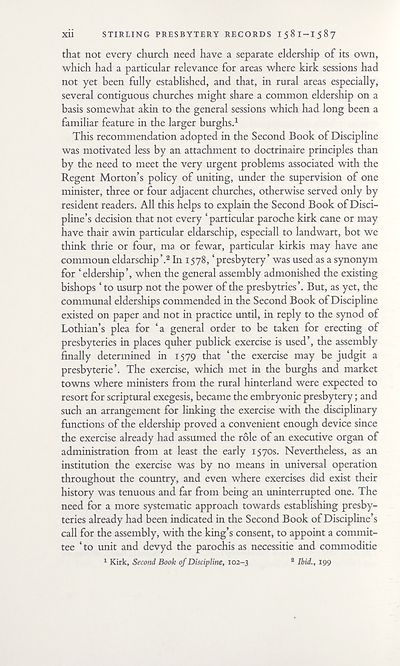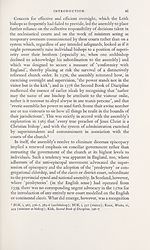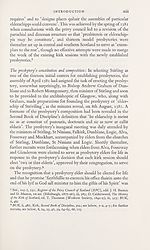Series 4 > Stirling Presbytery Records 1581-1587
(17) Page xii
Download files
Complete book:
Individual page:
Thumbnail gallery: Grid view | List view

xii STIRLING PRESBYTERY RECORDS 1581-1587
that not every church need have a separate eldership of its own,
which had a particular relevance for areas where kirk sessions had
not yet been fully established, and that, in rural areas especially,
several contiguous churches might share a common eldership on a
basis somewhat akin to the general sessions which had long been a
familiar feature in the larger burghs.1
This recommendation adopted in the Second Book of Discipline
was motivated less by an attachment to doctrinaire principles than
by the need to meet the very urgent problems associated with the
Regent Morton’s policy of uniting, under the supervision of one
minister, three or four adjacent churches, otherwise served only by
resident readers. All this helps to explain the Second Book of Disci¬
pline’s decision that not every ‘particular paroche kirk cane or may
have thair awin particular eldarschip, especiall to landwart, bot we
think thrie or four, ma or fewar, particular kirkis may have ane
commoun eldarschip’.2 In 1578, ‘presbytery’ was used as a synonym
for ‘eldership’, when the general assembly admonished the existing
bishops ‘ to usurp not the power of the presbytries’. But, as yet, the
communal elderships commended in the Second Book of Discipline
existed on paper and not in practice until, in reply to the synod of
Lothian’s plea for ‘a general order to be taken for erecting of
presbyteries in places quher publick exercise is used’, the assembly
finally determined in 1579 that ‘the exercise may be judgit a
presbyterie’. The exercise, which met in the burghs and market
towns where ministers from the rural hinterland were expected to
resort for scriptural exegesis, became the embryonic presbytery; and
such an arrangement for linking the exercise with the disciplinary
functions of the eldership proved a convenient enough device since
the exercise already had assumed the role of an executive organ of
administration from at least the early 1570s. Nevertheless, as an
institution the exercise was by no means in universal operation
throughout the country, and even where exercises did exist their
history was tenuous and far from being an uninterrupted one. The
need for a more systematic approach towards establishing presby¬
teries already had been indicated in the Second Book of Discipline’s
call for the assembly, with the king’s consent, to appoint a commit¬
tee ‘ to unit and devyd the parochis as necessitie and commoditie
1 Kirk, Second Book of Discipline, 102-3 a Ibid., 199
that not every church need have a separate eldership of its own,
which had a particular relevance for areas where kirk sessions had
not yet been fully established, and that, in rural areas especially,
several contiguous churches might share a common eldership on a
basis somewhat akin to the general sessions which had long been a
familiar feature in the larger burghs.1
This recommendation adopted in the Second Book of Discipline
was motivated less by an attachment to doctrinaire principles than
by the need to meet the very urgent problems associated with the
Regent Morton’s policy of uniting, under the supervision of one
minister, three or four adjacent churches, otherwise served only by
resident readers. All this helps to explain the Second Book of Disci¬
pline’s decision that not every ‘particular paroche kirk cane or may
have thair awin particular eldarschip, especiall to landwart, bot we
think thrie or four, ma or fewar, particular kirkis may have ane
commoun eldarschip’.2 In 1578, ‘presbytery’ was used as a synonym
for ‘eldership’, when the general assembly admonished the existing
bishops ‘ to usurp not the power of the presbytries’. But, as yet, the
communal elderships commended in the Second Book of Discipline
existed on paper and not in practice until, in reply to the synod of
Lothian’s plea for ‘a general order to be taken for erecting of
presbyteries in places quher publick exercise is used’, the assembly
finally determined in 1579 that ‘the exercise may be judgit a
presbyterie’. The exercise, which met in the burghs and market
towns where ministers from the rural hinterland were expected to
resort for scriptural exegesis, became the embryonic presbytery; and
such an arrangement for linking the exercise with the disciplinary
functions of the eldership proved a convenient enough device since
the exercise already had assumed the role of an executive organ of
administration from at least the early 1570s. Nevertheless, as an
institution the exercise was by no means in universal operation
throughout the country, and even where exercises did exist their
history was tenuous and far from being an uninterrupted one. The
need for a more systematic approach towards establishing presby¬
teries already had been indicated in the Second Book of Discipline’s
call for the assembly, with the king’s consent, to appoint a commit¬
tee ‘ to unit and devyd the parochis as necessitie and commoditie
1 Kirk, Second Book of Discipline, 102-3 a Ibid., 199
Set display mode to:
![]() Universal Viewer |
Universal Viewer | ![]() Mirador |
Large image | Transcription
Mirador |
Large image | Transcription
Images and transcriptions on this page, including medium image downloads, may be used under the Creative Commons Attribution 4.0 International Licence unless otherwise stated. ![]()
| Scottish History Society volumes > Series 4 > Stirling Presbytery Records 1581-1587 > (17) Page xii |
|---|
| Permanent URL | https://digital.nls.uk/126646359 |
|---|
| Description | Over 180 volumes, published by the Scottish History Society, containing original sources on Scotland's history and people. With a wide range of subjects, the books collectively cover all periods from the 12th to 20th centuries, and reflect changing trends in Scottish history. Sources are accompanied by scholarly interpretation, references and bibliographies. Volumes are usually published annually, and more digitised volumes will be added as they become available. |
|---|


